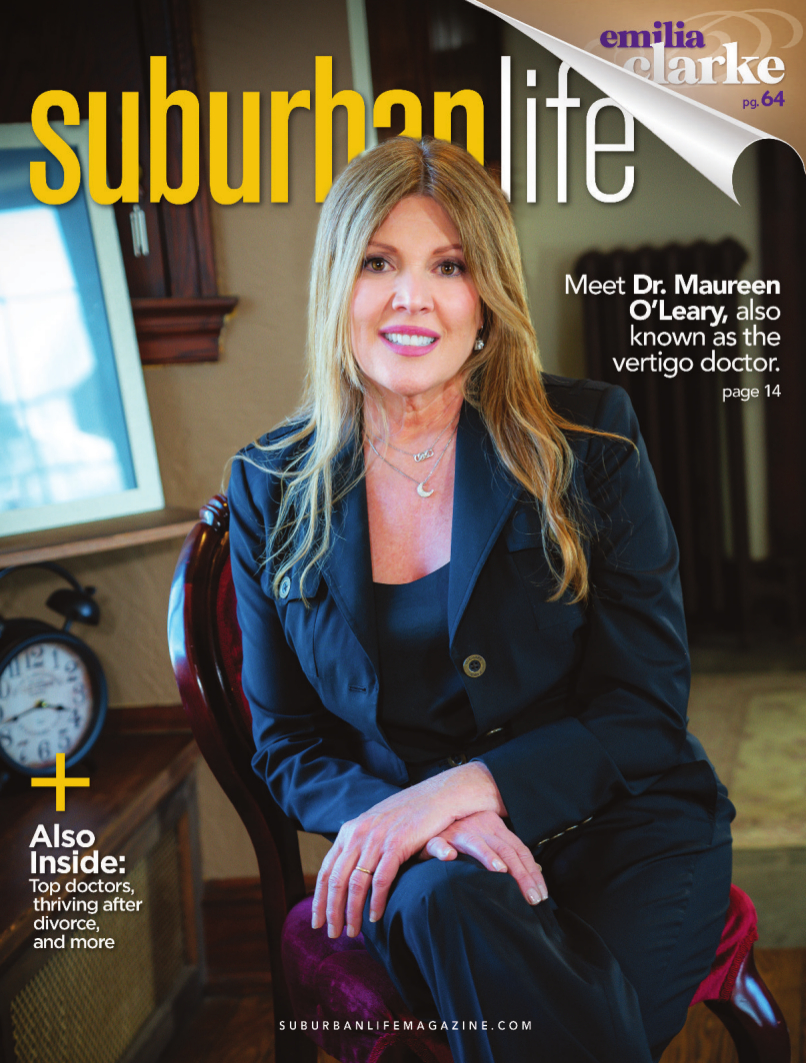
Restoring Balance
Considered a pioneer in her field, Dr. Maureen O’Leary helps patients recover from dizziness and balance issues at The Vertigo Centre in Springfield.
Although it has been the subject of a classic Hitchcock film and the title of a hit song by U2, the general public is still pretty much in the dark when it comes to the condition known as vertigo. Maureen O’Leary, DPT, a groundbreaking physical therapist from Delaware County, is doing her best to change that.
Dr. O’Leary owns The Vertigo Centre, a subdivision of her general PT practice, Maximum Rehab, located in Springfield. Her aim is to treat patients experiencing dizziness and balance issues as a result of problems with the vestibular system in the inner ear.
When Dr. O’Leary started out in the field more than 20 years ago, she envisioned devoting her career to sports medicine and helping patients rehabilitate from torn rotator cuffs, knee replacements, and lower back pain. A trip to Western Pennsylvania ended up changing the course of her life, and led to her discovery of an emerging branch of health care that soon became her passion.
“The chief of neurology at the hospital I was working at took me on a trip to the University of Pittsburgh Eye and Ear Institute to investigate what vestibular rehab was all about,” she says. “It was brand new back in the ’90s and in the early stage of being used as physical therapy to treat vestibular disorders. I just became fascinated with it, so I totally shifted gears and I have been studying it ever since. When I got the opportunity to open my own practice, I knew I was going to be doing something like The Vertigo Centre.”
Dr. O’Leary still offers traditional physical therapy through Maximum Rehab, but The Vertigo Centre enables her to provide assistance for a condition that most people cannot even define.
“It’s great that they have awareness campaigns for autism and breast cancer and everything else, but there really should be a vertigo awareness platform, too,” she says. “Too often people simply go to their primary care doctor and get a medication, which is just a Band-Aid. As a vestibular therapist, I can be a resource—to doctors and their patients—and really fix the problem.”
As Dr. O’Leary explains, vertigo is a symptom of a variety of issues, including benign paroxysmal positional vertigo (BPPV), more commonly known as “the crystal problem.” Crystals found in the inner ear fall from where they’re supposed to be, and when people lay down, sit up, bend over, or reach up, they get a spinning sensation that leads to nausea and equilibrium issues.
Vertigo is often a symptom of concussion, Ménière’s disease, viruses that attack the inner ear, and vestibular migraines, among others. When a patient visits her office, Dr. O’Leary’s first order of business is to discover the root cause. She examines the patient’s inner ear, as well as their eyes, as the two are intimately connected, to reveal the true source of the problem.
Dr. O’Leary can detect the issue by directly examining the patient’s eyes, but she also utilizes video goggles, in which an infrared camera projects the person’s eyeball onto a screen. The patient is then put in the dark so the eyes do not have anything visually to fixate on.
“We suppress the vision and then we do certain head movements and look for what’s called nystagmus, which are involuntary, jerky eye movements that can help us determine where the problem lies,” she says. “It’s more likely to be observed when they have the video goggles on, because if they stare at something, sometimes they can control the nystagmus. It’s a great clinical tool to help diagnose the problem.”
After the diagnosis is made, Dr. O’Leary devises a treatment plan that involves specific exercises to retrain the brain. In the case of BPPV, she provides different maneuvering to reposition the crystals in the ear. All the while she takes time to explain each step to the patients and their caregivers.
“Patient education is so important,” she says. “I’m trying to get them to do things that will provoke the vertigo, and that can be very scary. I explain to them what I’m going to do and why they need to do these exercises that are much different from bicep curls or back stretches. Once we’ve fostered that trust, we can help them proceed with the treatment and put them on the road to getting better.”
Vestibular disorders can affect men and women of all ages; Dr. O’Leary sees patients from their 20s all the way to their 90s. Most patients come from surrounding communities, though some will travel long distances to see her, even from out of the country.
Dr. O’Leary recommends that people do not try to treat themselves but instead seek the help of an experienced vestibular rehabilitation specialist like herself. Depending on their specific issue, age, and other health concerns, she can help them recover in as little as one or two visits; some may need longer treatment over the course of three to six months.
“Often patients come in holding walls and holding furniture to walk, and a lot of times they can’t drive themselves,” she says. “It can really wreck people’s lives, and they’re put on hold until this gets fixed. It makes my day when the patients say they’re feeling better. You can always tell the difference in their appearance and their smiles.”
While Dr. O’Leary hopes to make more people aware of vertigo and how it can be treated, she is pleased that vestibular rehab is now being taught to aspiring physical therapists and that more professionals are now offering it. She is also proud of the role she has played in its development.
“I have my mentors who are literally world-renowned at this point, but I do feel like a pioneer in the field, just because I was doing it when so few knew about it,” she says. “We need more awareness out there for the patients, so they don’t have to hop from doctor to doctor trying to find out what’s wrong with them. It’s important for us to get the word out and let them know they don’t have to live with this.”
The Vertigo Centre
57 S. State Road
Springfield, PA 19064
(610) 604-4800
TheVertigoCentre.com
57 S. State Road
Springfield, PA 19064
(610) 604-4800
TheVertigoCentre.com
Photo by Jody Robinson
Published (and copyrighted) in Suburban Life, February 2023.



